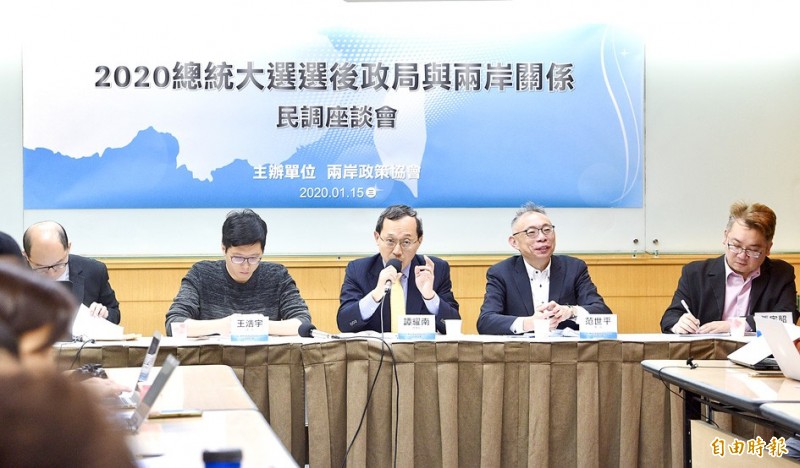《TAIPEI TIMES》 Majority favors cross-strait dialogue: poll

From left, Cross-Strait Policy Association secretary-general Chang Pai-ta, Taoyuan City Councilor Wang Hao-yu, association president Stephen Tan, National Taiwan Normal University professor Fan Shih-ping and association researcher Chang Yu-shao announce the results of a post-election opinion poll in Taipei yesterday. Photo: Peter Lo, Taipei Times
By Lin Chia-nan / Staff reporter
A majority of respondents in a post-election opinion poll urged President Tsai Ing-wen (蔡英文) to initiate a cross-strait dialogue, while Beijing’s latest moves indicate that it might be considering softening its Taiwan policy, the pan-green Cross-Strait Policy Association said yesterday.
Asked about Tsai’s speech after winning the presidential election on Saturday last week, 66.1 percent of respondents said they were satisfied, while 16.2 percent were not, association secretary-general Chang Pai-ta (張百達) told a news conference in Taipei.
Up to 78 percent said they support Tsai’s call for “peace, reciprocity, democracy and dialogue” across the Taiwan Strait in her speech, he said.
Asked if the Chinese Communist Party (CCP) should start a dialogue with Tsai’s Democratic Progressive Party (DPP) after the latter won a landslide victory, 59.8 percent said it should, while 20.5 percent said it should not, he said.
A dialogue between the pan-green and pan-blue camps might pave the way for a new cross-strait dialogue, association researcher Chang Yu-shao (張宇韶) said.
Radical advocates of unification and independence have lost support as demonstrated by the defeat of the pro-unification New Party and the pro-independence Taiwan Action Party Alliance in the presidential and legislative elections, he added.
For a cross-strait dialogue to happen, leaders from the two sides must agree on certain political bases, association president Stephen Tan (譚耀南) said, urging Beijing to acknowledge the existence of the Republic of China (ROC).
The so-called “1992 consensus” has been rejected by Taiwanese, as the election results showed, while the ROC has become the common denominator of Taiwanese society, he added.
Chinese President Xi Jinping (習近平) might be considering softening Beijing’s Taiwan policy, as protests in Hong Kong against a proposed extradition bill, which has since been scrapped, and the results of the Taiwanese elections showed that Chinese officials have made wrong political judgements, National Taiwan Normal University political science professor Fan Shih-ping (范世平), said
The Chinese government on the eve of the elections made an unusual announcement that Chinese central inspection officers had visited China’s Taiwan Affairs Office (TAO) and the Chinese Ministry of Foreign Affairs three or four months ago, and berated TAO Minister Liu Jieyi (劉結一) and Chinese Minister of Foreign Affairs Wang Yi (王毅), he said.
Editorials published by the Chinese-language China Times and China Review (中評社) indicate that Xi might be thinking of adopting a milder approach to deal with Taiwan and Hong Kong, he said, adding that Beijing might contact the Tsai administration.
US Army Secretary Ryan McCarthy said at an event in Washington on Friday last week that the US plans to deploy two specialized task forces to the Pacific in two years to counter the Chinese threat.
Islands east of Taiwan and the Philippines are likely locations, McCarthy later said in an interview with Bloomberg.
Asked about the planned US deployment, Tan said that Taiwan-US ties are in a dynamic balance and would change in correlation to cross-strait relations.
The task forces are more likely to be deployed on a Philippine island, as Taiwan is in a sensitive location, Taoyuan City Councilor Wang Hao-yu (王浩宇) said.
The “1992 consensus,” a term former Mainland Affairs Council chairman Su Chi (蘇起) in 2006 admitted making up in 2000, refers to a tacit understanding between the Chinese Nationalist Party (KMT) and the CCP that both sides of the Strait acknowledge there is “one China,” with each side having its own interpretation of what “China” means.
新聞來源:TAIPEI TIMES



















